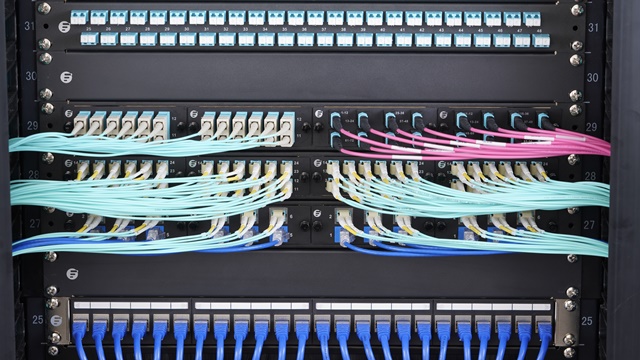Structured Fiber Cabling Solutions for Network & Server Cabinet
How does your network or server cabinet look like? Are they stocked with varied servers or networking equipment connected with long cables that reach out to the devices on the other cabinet or enclosure? This is exactly what we used to call point-to-point cabling. However, it is also an art to keep a neat cabling. This article unveils a compelling new cabling method—structured fiber cabling solutions for network&server cabinet.
What Is Structured Cabling and How Does It Matter?
In recent years it has become apparent that fiber-optics are replacing copper wire as an appropriate means of communication signal transmission. The standardized architecture and components for communications cabling formulated by the EIA/TIA TR42 committee—structured cabling is used as a voluntary standard by manufacturers to ensure fiber-optics interoperability. In a structured cabling system, a variety of patch panels and trunk cables are harnessed to create a structure that allows for hardware ports to be connected to a patch panel at the top of the server rack. That patch panel is then connected to another patch panel via a trunk (multi-fiber assembly designed for use in conveyance) in the MDA (Main Distribution Area). When you have several servers, with multiple patch connections and power cords running through your server rack, you need to keep them arranged and managed with an excellent rack cable management system.
Here some may wonder why bother to cost more on the connecting gadgets? Well, without running long patch cords from equipment racks, MACs are much quicker as the cable and port tracing becomes a much easier job. The potential for downtime goes down with the reduced potential for human error. A structured cabling system will look aesthetically pleasing.
Structured Fiber Cabling Solutions for Network & Server Cabinet
In the server room, there may be a server cabinet and a network cabinet for the storage of routers, patch panels, switches and a wide variety of networking equipment as well as networking accessories. Taking FS GR600-series server cabinet and GR800-series network & server cabinet housing 10G and 40G applications as an example, let’s see an exemplary structured fiber optic cabling.
Server Rack to Network Rack
As for intra-rack cabling, say server rack to network rack (10G-40G), connect the 10Gbe switch to a MTP-8 MTP/MPO breakout cassette via a 10GBASE-SR SFP+ transceiver and an LC fiber optic patch cable. Then bridge the cassette with fiber adapter panel which is finally linked to the 40Gbe QSFP+ uplink port on a 10Gbe switch through the MTP trunk cable and a 40GBASE-SR4 QSFP+transceiver. In this respect, the centralized cabling solution keeps cables organized and out of critical airflow paths.
Network Rack to Core Rack
When it comes to network rack to core rack (40G-40G), connect the 40Gbe QSFP+ uplink port on a 10Gbe switch to the FS ultra high density fiber adapter panel with 6 MTP adapters through the MTP trunk cable and a 40GBASE-SR4 QSFP+transceiver. Then draw together two same adapter panels together via an MTP trunk cable. Finally, link the second adapter with the 40Gbe switch by the 40GBase-SR4 QSFP+ MTP/MPO transceiver module and MTP trunk cable. In this way, you can save much energy on tracing each devices.
Rack Cable Management
To realize a structured fiber optic cabling for server cabinet, rack cable management is crucial. FS also provides FHD blanking fiber adapter plate, 1U metal horizontal lacer panel with 5 rotating and detachable plastic D-rings, 1U rack blank panel, colorful T type magnetic velcro cable tie and P type adhesive label paper sheets.
Conclusion
Structured cabling systems use various product sets, like fiber optic trunks and fiber optic enclosures, to create an easy-identifying, good-looking, ordered cabling infrastructure. FS boast various tools positioned as structured cabling solution for network & server cabinet.





评论
发表评论